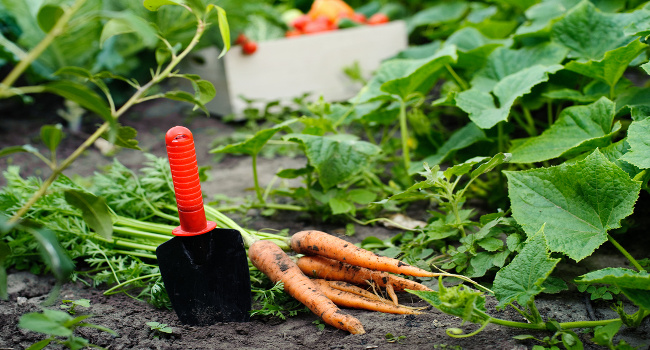
In this guest article, Penny Hall looks at veganics, a system of organic farming that avoids the use or exploitation of animals as much as possible.
Being vegan is, for many of us, a baseline expression of living ethically and ecologically, but it is worth remembering that plant-crop agriculture can be very harmful to the environment and to farmworkers, and that both conventional and organic growing methods routinely exploit and kill animals and destroy their habitats.
However, veganic, vegan or stock-free organic gardening minimises the harms normally associated with the growing of plants. Not using pesticides spares the lives of countless bees, butterflies and other insects, as well as aquatic animals. Heavy machinery is out, so small mammals don't get slaughtered by tractors and harvesters. Birds and local fauna do not meet with firearm violence when they sample crops. Soil health is nurtured and maintained by microorganisms that might otherwise be destroyed by industrial chemicals.
Local, multiple-crop gardening creates a healthily diverse ecosystem inside and out. A wide range of fruit, vegetable, nut, seed, grain, bean, herb and spice plants growing together replicates the biodiversity found in natural environments like rainforests and mangroves and provides an optimal number of dietary nutrients that lose little taste or value from travelling much shorter distances. More local production also reduces fossil fuel usage from reduced transportation and gives those in both the global north and south greater freedoms to feed themselves in far more just ways.
Veganics systematically approaches sustainable, ecologically viable, productive and beneficial food production whilst factoring in the non-human animals that inhabit the productive land and refusing to use the products of animal cruelty and exploitation, like bone meal and manure. The use of netting and fencing is reserved for the protection of crops from the wholesale predation of birds and burrowing animals, and insect or viral infestation is dissuaded by the application of intercropping, companion and succession planting, mulching, and more robust plants grown in highly nutritious soils.
It can be overwhelming to consider all that is involved in the production of our plant food, let alone participate more actively. Horticulture can seem very "other" to those of us used to buying all our food and occasionally neglectfully murdering houseplants. Yet a powerful way of persuading more gardeners and farmers to embrace veganic methods is to get involved. The following resources may help to inspire you.

© Vegan Australia | Registered as a charity by the ACNC | ABN 21 169 219 854